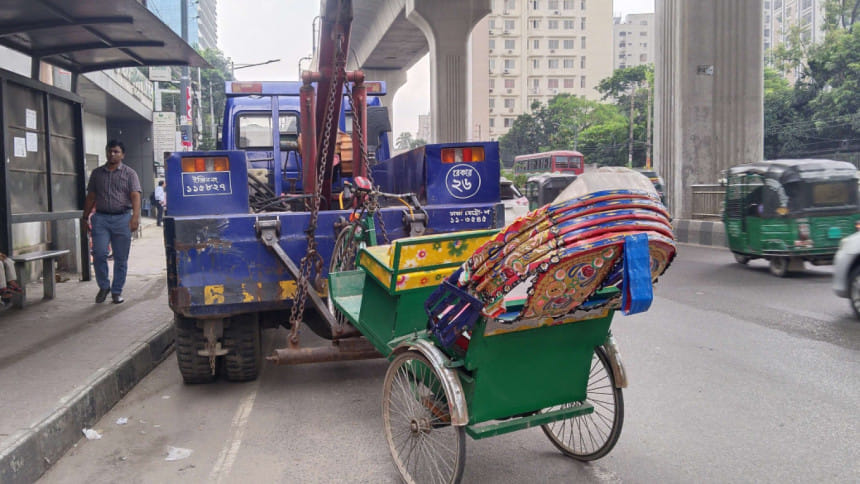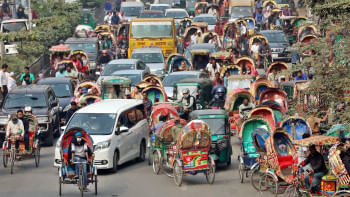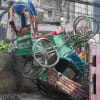Rickshaws, rights, and the rulebook

Recently, Dhaka North City Corporation (DNCC) launched a long-anticipated crackdown on rickshaws, especially battery-powered ones, operating on the capital's main roads. Within hours, around 30 vehicles were seized, and scenes of drivers breaking down in tears quickly circulated online. Some collapsed to the ground, devastated at the loss of their livelihoods. In a city that often confuses chaos with character, Dhaka's latest attempt to restore some semblance of road sanity has, predictably, met with backlash. The public conversation fractured into two polarised camps: one hailing the move as long overdue, the other condemning it as a classist assault on the livelihoods of the poor. But somewhere between these extremes lies the harder, more uncomfortable truth.
Battery-operated rickshaws, by law, are not allowed on major roads of DNCC. Not because someone woke up with a vendetta against three-wheelers, but because they became one of the leading contributors to road accidents. These vehicles lack basic safety measures and are driven without formal documents, frequently speeding and weaving dangerously through traffic. Passengers riding them are not safe. Nor are pedestrians crossing the road. Anyone who has had to drive or walk in Dhaka during rush hour knows this. These rickshaws, while affordable and accessible, are often chaotic and erratic. They swerve unexpectedly, brake without warning, and in many cases, operate outside any system of accountability. None of this is breaking news. And, none of this has happened in the shadows. For several months, these vehicles have been tolerated in a kind of legal limbo and as a daily reminder of a state that often looks away rather than step in. Drivers, in turn, invested what little they had to enter a system that was never fully legal to begin with. This is not just a governance failure but a betrayal of the poor in slow motion. It is a deeply flawed cycle, where informality fills the void left by inadequate policy, and the informal becomes so embedded that even lawful enforcement begins to look unjust. And, when enforcement agencies finally decided to act, after issuing repeated warnings, the narrative quickly turned to one of state cruelty.
So, is this crackdown selectively cruel? That question deserves to be taken seriously. Too often, policy disproportionately affects those who already live precariously; those who do not have the cushion to absorb sudden shocks. In this case, the people caught in the dragnet are those who have been systematically left without alternatives. They were allowed to live in an illusion of legitimacy until the curtain was abruptly pulled back.
But at the same time, we must ask whether it is progressive to accept illegality simply because it is popular or accessible? Are we doing justice to these people by letting them operate in a system that endangers them and everyone around them?
I do not think it is cruel to want our roads to be safer. It is cruel, however, if we do not offer people a way to be part of that safety. This is not a case of overnight authoritarianism but one that is an inevitable outcome of decades of selective ignorance. Here, the state's failure to regulate, license, and formalise these vehicles for so long has bred a false sense of legitimacy. So, the failure is not on these drivers but on the system. And, while we begin enforcement, we must also reckon with responsibility. DNCC has already announced training programmes for rickshaw drivers scheduled to begin this month. Those who complete the training will be issued valid licenses. And rickshaws produced by approved manufacturers will be allowed in designated areas.
However, the promised training programmes must be real, accessible, and timely. We must ensure alternative employment pathways for those affected. The debate is not whether the poor deserve to earn a living. Of course they do. The concern, therefore, is what kind of system we are allowing them to earn in. Informality may offer quick entry points, but it also locks people out of long-term security. A driver with no license and no vehicle registration has no protection, no insurance, no labour rights, and no claim if something goes wrong. It is a freedom with no safety net. Is that the best we can offer? So no, an illegal rickshaw is not a civil right. It is a symptom of a broken system that we have finally started fixing. And one that was long overdue.
Maisha Islam Monamee is student at the Institute of Business Administration (IBA) at the University of Dhaka and a contributor at The Daily Star. She can be reached at @monameereads on Instagram.
Views expressed in this article are the author's own.
Follow The Daily Star Opinion on Facebook for the latest opinions, commentaries, and analyses by experts and professionals. To contribute your article or letter to The Daily Star Opinion, see our guidelines for submission.

 For all latest news, follow The Daily Star's Google News channel.
For all latest news, follow The Daily Star's Google News channel. 










Comments